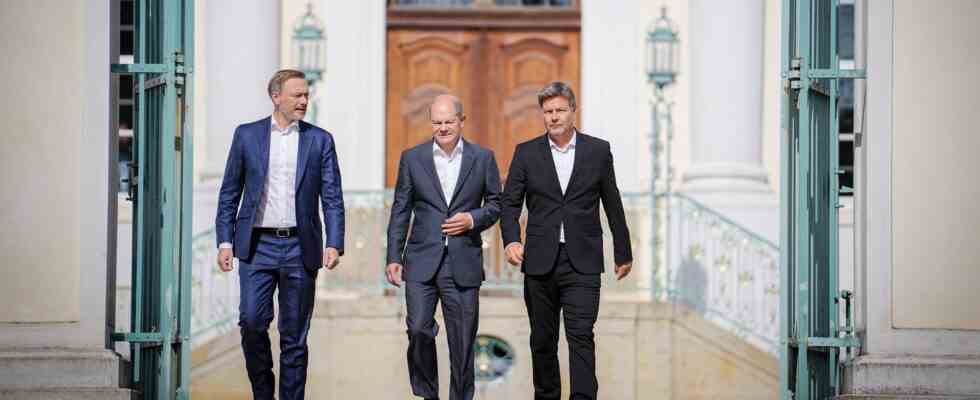comment
Status: 12/07/2022 4:29 p.m
Constant crises and annoying arguments in the midst of enormous challenges – nevertheless, the traffic light coalition has implemented a lot in the first year of its government.
After three years of the pandemic and almost a year after Putin’s attack on Ukraine, many people are tired and irritable. The consequences of inflation and high energy prices are eroding prosperity and depressing sentiment. Especially since not all relief measures are already noticeable. The polls for the traffic light coalition are correspondingly meager one year after taking over the government.
But the balance of traffic lights is better than the mood in the country. Never before has a new federal government faced such great challenges in its first year in office in the face of a terrible war in the middle of Europe. Yes, many decisions, such as arms deliveries to Ukraine or the extension of nuclear power plant operating times, were made too hesitantly. Technical mistakes were made in the implementation of important projects such as the gas and electricity price brake or the aid programs for citizens and companies. Little or nothing has happened in terms of reducing bureaucracy, digitization and the construction of new apartments. The initial team spirit of the “progress coalition” quickly gave way to government in permanent crisis mode and annoying quarrels within the coalition members.
Nevertheless, the traffic light largely delivered on the crucial points. In terms of foreign policy, the German government, with a good G7 presidency, helped ensure that NATO and the EU did not allow themselves to be split by Putin. In terms of economic policy, it was possible within a year to liberate Germany from its dangerous dependence on Russian energy. The gas storage facilities were full just in time for the onset of winter, and the first liquid gas terminal in Germany was completed in record time.
Important goals were also implemented domestically: the minimum wage was increased. Hartz IV will be replaced by citizen income. One million refugees from Ukraine were taken in. The “hot autumn” feared by many did not materialize – also because the traffic lights poured in burgeoning protests with aid programs worth 300 billion euros: the “double boom” and the Chancellor’s promise that nobody would be left in the lurch: “You will never walk alone”. .
North German sober, sometimes arrogant
A year ago, the new Federal Chancellor followed in the big footsteps of his globally respected predecessor. Like Angela Merkel, Olaf Scholz is not a charismatic but a hard-working chancellor. With his “Zeitenwende” speech in the Bundestag, Scholz has already written history.
But otherwise communication or inspiration are not among his strengths. In view of the difficult situation, many would have wished for a major speech or television address that offered orientation and encouragement. Scholz prefers to let actions speak and wait until he can announce results. Scholz comes across as North German sober, sometimes arrogant when he conveys to others that he always knew better.
In fact, Scholz can feel confirmed in many ways after a year. The immediate exit from Russian natural gas, also demanded by opposition leader Friedrich Merz, would have been devastating for the German economy. Instead of giving in to demands to single-handedly deliver heavy Leopard-type battle tanks to Ukraine if necessary, Scholz managed to strike a balance between actively supporting Ukraine on the one hand and not making Germany a party to the war on the other. Knowing full well that a large majority of Germans reject this. With his trip to China, which was much criticized in advance, Scholz was able to ensure that China now also warns Putin about the use of nuclear weapons.
Much announced, little implemented
However, Scholz and his traffic light coalition partners cannot rest on their laurels. Enormous challenges remain, such as the energy and climate transition. Much has only been announced, hardly anything has been implemented. Germany could become the pioneer and market leader for new climate-friendly technologies. But Germany is also threatened with the relocation of many industrial companies because of its high energy prices.
There is also a wide gap between aspiration and reality in the Bundeswehr: the special fund worth 100 billion euros has hardly improved the miserable equipment of the Bundeswehr so far. In view of the multi-billion shadow households, it is not just younger people who are wondering who will later pay off the mountain of debt.
The first traffic light year is also a good example of how quickly noble goals in coalition agreements become obsolete. Who would have guessed a year ago that formerly peace-loving Greens would be the loudest in their calls for heavy weapons for Ukraine? Or that the liberal “Lord Seal Keeper of the Debt Brake” Christian Lindner, as finance minister, had to incur most of the debt in the shortest possible time? Or that the Green Economics and Climate Protection Minister Robert Habeck has to travel the world to buy gas and bow to the Emir of Qatar for this?
Irrespective of such political irony: the report after one year of traffic lights is satisfactory overall. With better grades in the compulsory subjects, but worse performance grades.
Editorial note
Comments always reflect the opinion of the respective author and not that of the editors.

